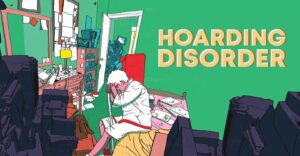If you’re struggling with compulsive hoarding, know that you’re not alone. There are many other people out there who understand what you’re going through and who want to help you overcome your challenges. This article will introduce you to some of the best hoarding support groups in the country so that you can get the help you need. There are also some benefits and tips on how to join these hoarding support groups.
Contents
What Is Hoarding?
 Hoarding is the excessive accumulation of items, even if the items are of no value. People who hoard often feel a need to save these items, and may feel very attached to them. Hoarding can be a problem if it causes clutter and makes it difficult to use living spaces in a normal way.
Hoarding is the excessive accumulation of items, even if the items are of no value. People who hoard often feel a need to save these items, and may feel very attached to them. Hoarding can be a problem if it causes clutter and makes it difficult to use living spaces in a normal way.
There are different types of hoarders, and each type may require different types of support. The four main types of hoarders are:
1. Sentimental hoarders: These hoarders keep items because they are sentimental or have emotional value. For example, they may keep items that belonged to a deceased loved one, or items that remind them of a happy memory.
2. Compulsive hoarders: These hoarders feel the need to save everything because they believe it could be useful in the future. They may also feel overwhelming anxiety at the thought of throwing anything away.
3. Animal hoarders: These hoarders collect animals, often more than they can properly care for. They may believe that they are the only ones who can provide a good home for the animals, or they may simply enjoy the companionship that animals provide.
4. Collectors: These hoarders collect items that fall into a specific category, such as stamps, coins, books, or dolls. They may derive pleasure from collecting and displaying their items, or they may simply enjoy the challenge of completing a collection.
How To Get Help For Hoarding?

If you or someone you know is struggling with hoarding, there is help available. Here are some ways to get started:
1. Talk to your doctor or mental health professional. They can help you understand what might be causing the hoarding behavior and develop a plan to address it.
2. Join a hoarding support group. This can provide you with valuable information and support from others who are dealing with similar issues.
3. Seek professional help. A therapist or counselor who specializes in helping people with hoarding can provide individualized treatment and support.
4. Get involved in community activities. Volunteering or participating in community events can help you feel connected and give you a sense of purpose.
5. Educate yourself about hoarding. The more you know about the condition, the better equipped you’ll be to deal with it.
What Are Hoarding Support Groups?
 Some people live in homes so cluttered and filled with possessions that they can barely move, and their condition causes tremendous anxiety and isolation. If you or someone you know suffers from compulsive hoarding, there are support groups available to help.
Some people live in homes so cluttered and filled with possessions that they can barely move, and their condition causes tremendous anxiety and isolation. If you or someone you know suffers from compulsive hoarding, there are support groups available to help.
Hoarding support groups are a type of therapy group that helps people with the mental disorder known as hoarding. The groups are typically led by a therapist and focus on education, support, and treatment for hoarding. The goals of hoarding support groups are to provide a safe and supportive environment for people with hoarding disorder, to help them understand their disorder, and to learn coping and organizing skills. There are also many online hoarding support groups available. There maybe be a fee to participate in some hoarding support groups.
Hoarding support groups provide a safe and supportive space for people to share their experiences and learn from others. These groups can be an invaluable resource for finding practical tips and solutions, as well as emotional support.
Types of Hoarding Support Groups

There are many types of hoarding support groups available to those struggling with the condition. Some groups focus on helping people declutter their homes, while others may provide more emotional support. Some common types of hoarding support groups include:
1. Clutter Cleanup Groups: These groups typically meet once a week and help members declutter their homes. Members typically work on one area of their home each week and receive help and support from other members.
2. Self-Help Groups: These groups typically provide emotional support and guidance for those struggling with hoarding. They may meet in person or online, and some groups may also offer resources for decluttering.
3. Family and Friends Support Groups: These groups are designed to help the loved ones of those struggling with hoarding. They may provide emotional support and resources for dealing with the condition.
4. Professional Support Groups: These groups are usually run by therapists or other mental health professionals. They may offer individual or group therapy, and some may also offer resources for decluttering.
Tips For Joining Hoarding Support Groups

There are many benefits to joining a support group for people who hoard. These groups can provide a sense of community and understanding, offer helpful tips and advice, and give people the opportunity to share their experiences with others.
If you’re considering joining a hoarding support group, here are a few tips to make the most of the experience:
1. Find a group that’s right for you. There are many different types of hoarding support groups, so it’s important to find one that meets your needs and expectations. Ask around for recommendations or search online for reviews.
2. Be honest with yourself. To get the most out of a support group, you need to be honest about your situation. This means being open about the extent of your hoarding problem and your motivations for wanting to change.
3. Set realistic goals. It’s important to have realistic expectations when joining a hoarding support group. This means setting goals that are achievable and relevant to your specific situation. For example, rather than aiming to completely declutter your home, you might set a goal of reducing the amount of clutter by 50%.
4. Be active in the group. To get the most out of a hoarding support group, you need to be an active participant. This means contributing to discussions, offering advice and support to others, and sharing your own experiences.
5. Seek professional help. While hoarding support groups can be helpful, they should not be considered a replacement for professional help. If you’re struggling with a severe hoarding problem, it’s important to seek out professional treatment from a therapist or counselor.
Benefits of Hoarding Support Groups

If you or someone you know suffers from hoarding disorder, know that you are not alone. Millions of people suffer from this debilitating mental disorder, which can make everyday life a struggle. The good news is that there are many support groups available to help those suffering from hoarding disorder.
Here are some of the benefits of joining a hoarding support group:
1. Connects with others who understand what you’re going through: When you join a support group, you’ll be surrounded by others who truly understand what you’re going through. This can be an invaluable source of support and comfort, especially when family and friends don’t quite get it.
2. Gets tips and advice from those who have been there: Members of hoarding support groups have usually been dealing with the disorder for some time. This means they have a wealth of knowledge and experience to share with you. They can offer valuable tips and advice on everything from decluttering to dealing with difficult emotions.
3. Learns about new resources and treatments: Hoarding disorder is a relatively new disorder, so there is always something new to learn about it. Support group members can keep you up-to-date on the latest research and resources, as well as new treatments that may be available.
4. Feels less isolated and alone: One of the most difficult aspects of hoarding disorder is the isolation it can cause. Joining a support group can help you feel less alone and give you a sense of community.
5. Gets encouragement and motivation: It’s easy to feel like you’ll never be able to change when you’re dealing with a hoarding disorder. Support group members can offer much-needed encouragement and motivation, helping you believe that change is possible.
Alternatives of Hoarding Support Groups

There are many alternatives to traditional hoarding support groups. Some people prefer to seek help from a therapist or counselor, while others find self-help groups or online forums more helpful.
For those who prefer one-on-one help, therapy can be an effective way to address the underlying causes of hoarding and develop healthy coping mechanisms. Cognitive Behavioral Therapy (CBT) is a type of therapy that is effective in treating hoarding disorder.
Self-help groups provide support and guidance from people who have shared similar experiences. These groups can be a great way to learn about healthy coping mechanisms and connect with others who understand what you are going through.
Online forums can be a helpful resource for finding support and information about hoarding disorder. These forums can provide an anonymous space for people to share their experiences and connect with others who are going through similar challenges.
Conclusion
There are many different types of hoarding support groups available to help people who suffer from this disorder. These groups can provide valuable resources and information for those who need help dealing with their condition. If you or someone you know suffers from hoarding, consider reaching out to a support group in your area. With the right kind of help, hoarders can begin to take control of their lives and start living more manageable, clutter-free lives.
Hope this article was of help to you! If you are suffering from Hoarding, you may seek help from Therapy Mantra. We have a team of highly trained and experienced therapists who can provide you with the tools and skills necessary for overcoming Hoarding. Contact us today to schedule an online therapy or download our free OCD treatment app on Android or iOS for more information.


